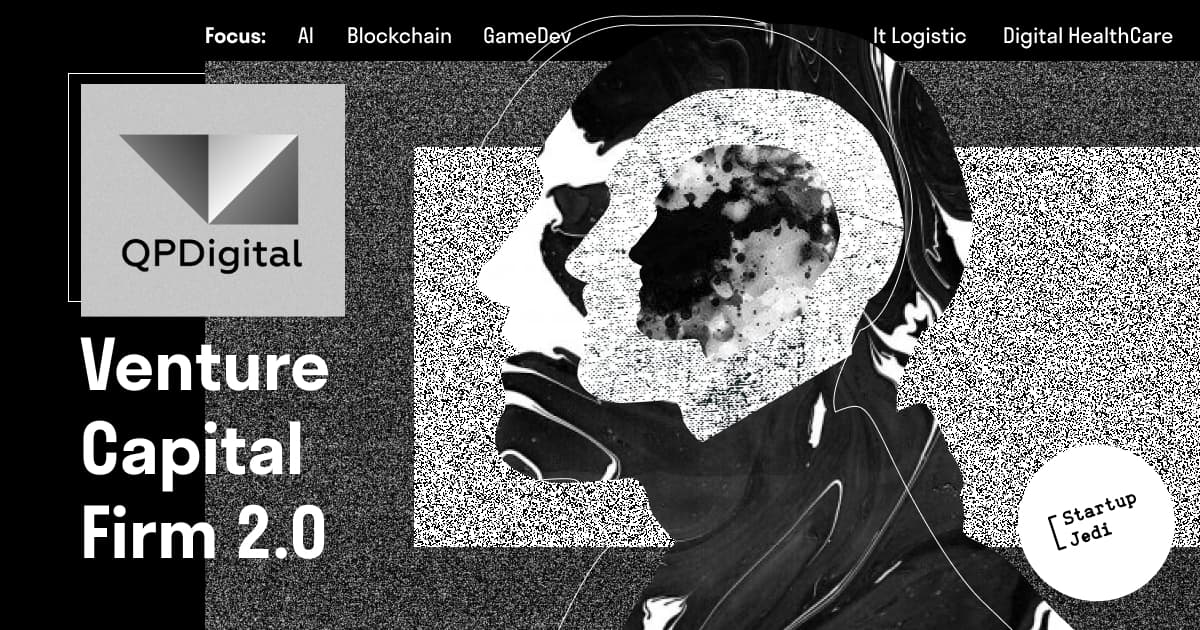
Startup Jedi
We talk to startups and investors, you get the value.
A wide audience first heard about Bitcoin in 2017, when its rate grew almost 20 times during the year. However, after that the currency rate began to fall, and the predictions of some enthusiasts that bitcoin could rise in price again to almost $100,000 seemed nonsense. Recent months have shown that nothing is impossible, and now the topic of cryptocurrencies, and the blockchain with it, is back on the radar. What has changed in the direction in recent years? What blockchain startups are being created and what is their future? CEO of the QPDigital fund Denis Valvachev shares his opinion on these topics.

Startup Jedi
We talk to startups and investors, you get the value.
QPDigital is a Ukrainian venture fund that was founded by Quarter Partners investment company in the end of 2020. The target sum of the fund is $100 million, the target formation time is 2 years. The field of interest: startups in the fields of IT-logistics, digital healthcare, gamedev, Artificial Intelligence and blockchain. QPDigital invests in startups at the early development stages: from pre-Seed to A rounds in Estern Europe. However, they will prefer those startups that have founders or co-founders from Ukraine.
The fund has already invested $2.6 million in 6 startups — Watched AI platform, Doc.UA online medical hub, WareTeka logistics platform, ABM Cloud service for the development and integration of cloud solutions — a GDPR-certified solution for rehabilitation after injuries and neurological diseases using gamification Racoon.Recovery, and Datrix, which is a service for optimizing work with big data.
...

— What was the driving force to launch QPDigital?
— The task is to diversify the business of our Quarter Partners holding, which, in addition to QPDigital, currently includes investments in such large projects as “Zhulyany”, the second-largest airport in Ukraine, UDP — the largest Ukrainian developer, “Biopharma” pharmaceutical company, which supplies drugs to dozens of countries.
In addition to diversification, we believe in the high potential of venture projects that originate from Ukraine: there is a huge number of IT outsourcing companies serving global corporations. Many of these IT outsourcers are increasingly moving towards creating their own products that can conquer the global market.
— How did you select the first portfolio projects of the fund?
— The first QPDigital investments were made in digital medicine, logistics and artificial intelligence. We cannot disclose the detailed terms of the deal, but we strive to receive a share of 10 to 25% with a yield potential of over 30% per annum.
— How is QPDigital different from the competitors?
— First of all, by the fact that we don’t consider anyone to be our competitors. We try to create synergies from partnerships with strong players: for example, we jointly invest in projects with Sigma Software.
Another important factor is that we belong to those funds that have a specialization, supported by both the expertise within the team and the expertise of our partners. For example, in work with fintech startups, I benefit from my previous experience: I was the managing director at the largest bank in Eastern Europe and was responsible for the development of all products for VIP clients. Sometimes we resort to IT expertise from Sigma Software, which helps us as a second opinion in the selection of some technologically complex projects.
— Do you provide expert support to the startups from your portfolio?
— Yes, we provide help to our startups in two directions: legal structuring of the company and business development. The legal structure of the company is built by taking two peculiarities into account: geographical location of the target clients and preferences of the future key investors.
In the business development part, we help startups to acquire new clients, the right investors, as well as, improve the marketing strategy and business model.
...

— A few words about the changes in the blockchain and cryptocurrency fields in the recent years: what directions in the niche aren’t to be the hot topic again?
— It is important to mention that the topic of storage decentralization (the Usenet project) and data transmission (the emergence of the Internet protocol FTP), which are the basis of the blockchain, is more than 50 years old. The first attempt at creating a cryptocurrency (called Ecash) was made by DigiCash over 30 years ago. The first successful launch of a decentralized accounting system and cryptocurrency took place 12 years ago: Bitcoin was launched in 2009.
I wouldn’t say that some niches in the blockchain are already irrelevant, since there are no large commercially successful projects ,except for those that are related to cryptocurrency. Therefore, blockchain is one of the few areas for the implementation of global business ideas, in which there is still a “blue ocean”.
— Why is this direction interesting in comparison with others?
— The peculiarity of blockchain technology is that it is based on a decentralized system for storing, accounting and transferring data — that is, there is no single “owner” who says: “It should be so!” Thus, when we compare blockchain with other directions, we mean, first of all, centralized systems. Today, any business that surrounds a person is 99.9% built on centralization in deciding how it will work: banks, shops, cafes, pharmacies decide on what terms to serve clients, but not the clients themselves.
Against this background, the blockchain has its pluses and minuses. The current disadvantages include the high cost of implementation, the slowness of transactions, the absence of a single “point of complaints”, limited scalability (equipment capabilities).
As obvious advantages, I would single out: immutability of data, transparency, greater trust in the system and the ability to create effective smart contracts (when a transaction is executed not at the will of someone, but on the fact of a specific event, regardless of the will of its participants).
...

— How investors and business angels are considering blockchain startups? Are they interested in the means of investing?
— So far, the majority of blockchain startups are at the very early development stage. For this reason, the majority of investors in this field are presented by business angels and medium-sized venture funds, but still some of the large players are already showing interest.
In Spring 2020, the NEAR Foundation company, which has created NEAR, a new blockchain protocol for developing decentralized apps, has attracted $21.6 in tokens. Among the 40 venture funds, the main was Andreessen Horowitz, one of the most respected in the venture market.
— Why is there so much hype around this direction but there are almost no “unicorns”? Libra from Facebook still haven’t seen the world…
— To my mind, the hype around the technology itself is quite reasonable. There are two key-factors, that are restraining blockchain projects from spreading:
Government regulation, or rather its absence; that is why many blockchain companies simply cannot legally transact with the “real world”. In some countries, legislations have already been adopted or are being developed in order to make it possible to legally and transparently operate blockchain projects. The experience of Belarus, which has become a pioneer on a global scale, can be referred to as a successful case. In Ukraine, we expect the adoption of the Law “On Virtual Assets” 3637 in the second reading. I think that such legislation will be also adopted in most developed countries in the next 1.5–2 years.
The lack of equipment capacity, that is capable of supporting large amounts of data. This problem will be solved in parallel by two processes. On the one hand, the power of the hardware will continue to grow at an exponential rate. On the other hand, blockchain technology itself tends to be simplified in order to reduce the load on equipment. In particular, this is done due to two things: sharding and the transition from the Proof-of-work mechanism of transaction confirmation to Proof-of-stake.
Regarding the sharding (sometimes sharding is a technique for scaling the work with databases, its essence is in dividing the database into separate parts so that each of them can be taken out on a separate server — Startup Jedi), the verification of transactions in the system is carried out not by all participants at once, but only by a certain part of it, which reduces the load on the entire network. And the transition from Proof-of-work to Proof-of-stake means that the probability of receiving a reward for a participant who has formed a new block in the system doesn’t depend on the power of his equipment, but on the number of “coins” that he already has. PeerCoin, Ethereum 2.0, NEAR cryptocurrencies are bright examples of the implementation of such approaches.
The slow launch of Facebook’s Libra payment blockchain system (which is now called Diem) is largely due to the country barriers: for example, the European Union was initially opposed to the system, as it could threaten their national interests. Diem is now awaiting approval from the Swiss authorities, which is likely to be obtained.
...

— What blockchain startups of the recent years have already shifted the paradigm or will do that in the nearest future?
— So far, there are perhaps no global commercially successful blockchain cases, apart from cryptocurrencies, the total number of which today exceeds 2.3 thousand.
There are some well-known market projects, but they are also cryptocurrency-related: crypto wallets, crypto exchanges, cryptocurrency analytics platforms, and some combine all of this together. These include Binance, CoinBase and others.
A worth mentioning global project is Hyperledger — a set of blockchain frameworks and tools that allow companies to create their own blockchain solutions. However, it is a non-profit and was created in 2015 by the Linux Foundation — a consortium of corporations led by IBM, SAP and Intel — to enhance collaboration between companies from different industries, ready to develop blockchain and technology of distributed networking.
I consider the financial sector, medicine, computer games to be one of the most likely areas for the emergence of successful blockchain startups in the coming years; as well as many projects related to the tokenization (digitization) of assets, which actively traded in large volumes in the real world (real estate, oil products, electronics, etc.).
A bright example of a project from the field of medicine can be the construction of a clinical research accounting system on the blockchain basis. This will allow solving at least two tasks: enhancing the transparency and speeding up the process — which ultimately will lead to reduction of its cost. We are now considering investing into one of these projects.
— Is it possible that the blockchain startup is going to appear in the QPDigital portfolio in the nearest future? How will you select them?
— Yes, we are planning to invest in such projects. To this end, we are actively cooperating with both the Ministry of Digital Transformation of Ukraine, which has developed the law “On Virtual Assets”, as well as with market players, recognized experts in the field of blockchain solutions, for example, Distributed Lab. They help us find interesting projects, as well as, give their expert opinion.
In general, we pay special attention to three components: the experience of the startup team, the presence of market demand for the product, and the willingness of other investors to enter the project.
Facebook: facebook.com/StartupJedi/
Telegram: t.me/Startup_Jedi
Twitter: twitter.com/startup_jedi
Comments